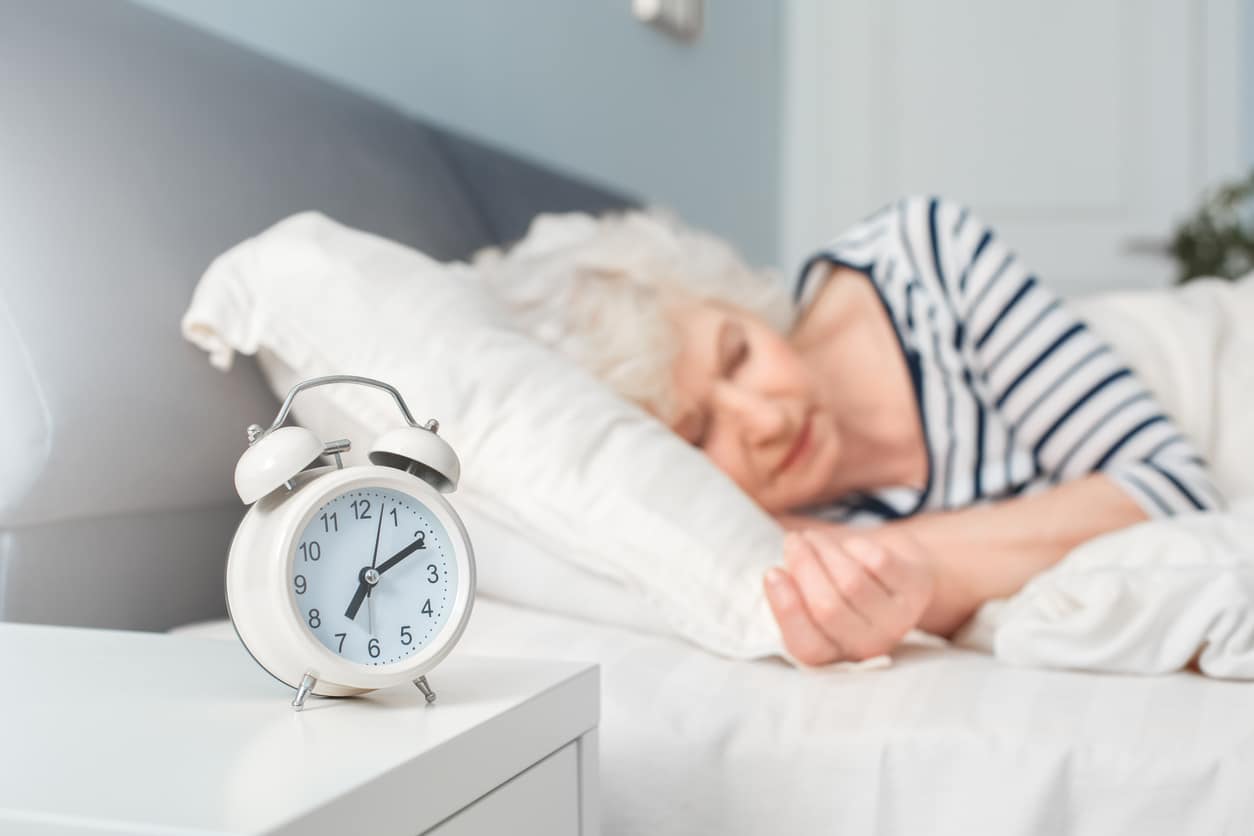An essential ingredient in the recipe for a long and happy life is quality sleep. But many older adults find it more and more difficult to not only sleep well but sleep enough and resort to over-the-counter medications to help. But there are plenty of ways to encourage sleep without drugs. Here are six sleep tips for older adults.
Tip #1 – Establish a routine
Perhaps the easiest sleep tips for older adults is to get on a schedule so that going to bed and getting up in the morning are always at the same times. Include in the routine a nightly snack so waking up hungry at 2:00 a.m. doesn’t happen, avoid caffeine, nicotine and alcohol, and take a warm bath to relax. Most older adults need seven to eight hours of sleep so create a routine to ensure that is possible every night. For more ways to get into a sleep routine, check out the health.arizona.edu document, “Sleep Hygiene.”
Tip #2 – Get exercise
Although it may seem counterproductive, another of the sleep tips for older adults is to be active and exercise regularly. But there are some rules to make it work to improve sleep. According to the hopkinsmedicine.org article, “Exercising for Better Sleep,” don’t exercise right before bedtime, but rather leave a few hours for the endorphins gained from exercise to dissipate so the brain isn’t too active. Also important is the fact that exercise raises body temperature which can also make sleep difficult, but falling body temperature actually increases sleepiness.
Tip #3 – Get sunshine
Like the rest of the body, aging changes the brain too. The part of the brain that controls circadian rhythms which signal sleepiness deteriorates, which in turn disrupts sleep/wake cycles. Since circadian rhythms are directly influenced by light it is essential to get the right amount of light at the right time, so one of the top sleep tips for older adults is to avoid bright light a few hours before bedtime and when waking during the night. Learn more in the cdc.gov article, “Effects of Light on Circadian Rhythms.”
Tip #4 -Address health problems
Health problems are also among the reasons older adults can’t get the sleep they need, so another of the essential sleep tips for older adults is to consider the possibilities. First, there are sleep disorders like insomnia, sleep apnea, restless leg syndrome, and narcolepsy that can wreak havoc on sleep as described in the mayoclinic.org article, “Sleep disorders.” The key to getting them under control is to see a physician and get a diagnosis so treatment can begin. Other potential sleep robbers are medications, pain, incontinence, snoring and stress. Each should be discussed with a physician to pinpoint causes and possible treatment options. Find more in the sleepadvisor.org article, “12 Factors Affecting Sleep and Your Sleep Quality.”
Tip #5 – Revamp the bedroom
Another sleep tip for older adults is that the bedroom should be dedicated to sleeping above all else. According to the sleepfoundation.org article, “The Bedroom Environment,” there are some important changes that make the bedroom a welcoming and sleep-inducing place to end the day. Among these are:
- Darkness – Keeping light out at night is key to balancing circadian rhythms so hang heavy light-blocking drapes if outside light is a problem and keep indoor lighting dim while preparing for bed.
- Temperature – Most people sleep best when the temperature is 65 degrees simply because a lower body temperature makes us sleepy.
- Noise – Needless to say noise is a sleep disruptor and noise at night can make getting and staying asleep difficult to impossible. Counter noise with noise-blocking drapes or a sleep machine that plays gentle sounds or white noise.
Tip #6 – Banish electronics
It is a fact that electronic devices disrupt sleep thanks to the light they emit on screens and the many noises that signal emails, texts and other updates. The first rule of thumb is to banish all electronics from the bedroom (Yes even the TV!) and leave them in other rooms far enough from the bedroom that you cannot hear.
What about e-readers? Another sleep tip for older adults is that according to the webmd.com article, “Tablets and E-Readers May Disrupt Your Sleep,” even the light from a tablet or other e-reader can impact sleep by suppressing the release of the sleep-promoting hormone melatonin.
Ganton’s Countryside makes it easy to sleep well at night and awake ready for each new day. For more information about Countryside, please call Margaret Nagel at (517) 206-5000 or download our brochure to learn about our care levels, cost, and amenities.


